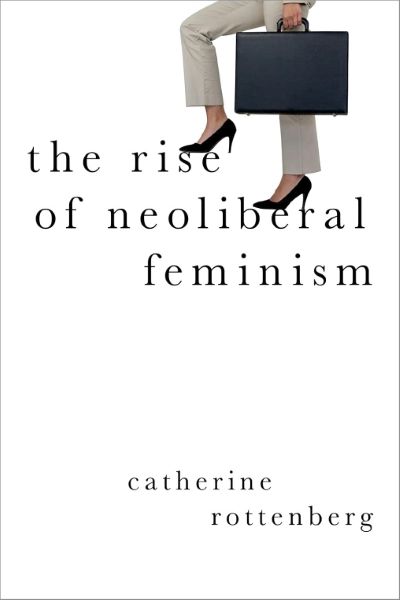The Rise of Neoliberal Feminism
A critical examination of how neoliberalism has co-opted feminist discourse, transforming it from a collective movement for social justice into an individualized pursuit of personal empowerment that serves corporate interests while abandoning the vast majority of women.

📝 Book Review
“The Rise of Neoliberal Feminism” stands as a crucial intervention in contemporary feminist discourse, offering a penetrating analysis of how neoliberalism has fundamentally transformed feminist politics in the twenty-first century. Catherine Rottenberg’s groundbreaking work exposes the ways in which feminist ideals have been co-opted, commodified, and redirected to serve the interests of neoliberal capitalism rather than advancing genuine gender equality and social justice.
Catherine Rottenberg brings exceptional scholarly credentials to this critical analysis. As Marie Sklodowska-Curie Visiting Professor in the Department of Sociology at Goldsmiths, University of London, and Senior Lecturer in the Department of Foreign Literatures and Linguistics and Gender Studies Program at Ben-Gurion University, Rottenberg combines deep theoretical knowledge with keen analytical insight into contemporary cultural and political dynamics. Her interdisciplinary approach, spanning feminist theory, political economy, cultural studies, and media analysis, provides a comprehensive framework for understanding the complex mechanisms through which neoliberalism has reshaped feminist discourse.
Rottenberg’s scholarly trajectory reflects a sustained commitment to examining the intersections between feminism, neoliberalism, and cultural politics. Her research has consistently focused on how progressive movements are transformed and potentially neutralized when they encounter the dominant economic and political logics of our time. This book represents the culmination of years of careful observation and analysis of how feminist discourse has been gradually but systematically reoriented away from collective struggle toward individual achievement.
The Neoliberal Transformation of Feminism
The central thesis of Rottenberg’s work revolves around the identification and analysis of what she terms “neoliberal feminism” – a particular strand of feminist discourse that has emerged as dominant in mainstream media, corporate culture, and political rhetoric. This form of feminism, she argues, has fundamentally abandoned the collective dimensions of feminist struggle in favor of an individualized approach that aligns perfectly with neoliberal economic imperatives.
Neoliberal feminism, as Rottenberg demonstrates, operates through a sophisticated process of ideological transformation that maintains the vocabulary and symbolic power of feminism while fundamentally altering its content and objectives. Rather than challenging systemic inequalities and structural barriers that prevent women’s advancement, neoliberal feminism focuses on empowering individual women to succeed within existing systems through personal optimization, skill development, and entrepreneurial thinking.
This transformation represents more than simply a shift in emphasis; it constitutes a fundamental reorientation of feminist politics. Where traditional feminist movements sought to transform social, economic, and political structures that perpetuated gender inequality, neoliberal feminism encourages women to adapt themselves to these structures and compete more effectively within them. The focus shifts from changing the game to playing it better, from collective solidarity to individual competition.
The Mechanisms of Co-optation
Rottenberg’s analysis reveals the sophisticated mechanisms through which neoliberalism has co-opted feminist discourse. Corporate culture has played a particularly crucial role in this process, with companies increasingly adopting feminist rhetoric while maintaining fundamentally exploitative practices. The rise of “feminist” corporate campaigns, “empowerment” marketing strategies, and corporate diversity initiatives represents not genuine commitment to gender equality but rather the strategic deployment of feminist language to enhance brand value and consumer appeal.
Media representations have similarly contributed to this transformation. Mainstream media outlets increasingly celebrate individual women’s achievements while ignoring or minimizing discussion of systemic barriers and collective struggles. The narrative focus shifts to stories of exceptional women who have “broken through” barriers through individual effort and determination, implying that structural change is unnecessary and that success is simply a matter of personal will and capability.
Political discourse has also been fundamentally altered by this neoliberal influence. Politicians and policy-makers increasingly frame gender equality issues in terms of economic efficiency and market optimization rather than social justice and human rights. Women’s advancement is justified not because it represents fundamental fairness but because it enhances economic productivity and competitiveness.
The Abandonment of Collective Struggle
One of Rottenberg’s most important insights concerns how neoliberal feminism systematically abandons the collective dimensions that have historically defined feminist politics. Traditional feminist movements were fundamentally about solidarity, mutual support, and collective action to transform unjust systems. Neoliberal feminism replaces this collective orientation with an individualistic focus on personal empowerment and achievement.
This shift has profound implications for feminist practice and politics. When feminism becomes primarily about individual women optimizing their personal circumstances rather than working together to challenge systemic oppression, it loses its transformative potential. Individual success stories become substitutes for structural change, and the focus shifts from creating better conditions for all women to helping exceptional women succeed despite adverse conditions.
The abandonment of collective struggle is particularly evident in how neoliberal feminism treats issues of intersectionality and structural inequality. Rather than recognizing that different groups of women face different barriers and require different forms of support and solidarity, neoliberal feminism tends to promote one-size-fits-all solutions based on individual empowerment and skill development.
The Corporate Appropriation of Feminist Language
Rottenberg provides detailed analysis of how corporate entities have appropriated feminist language and imagery for commercial purposes. Companies regularly launch “empowerment” campaigns that use feminist rhetoric to sell products and services while maintaining workplace practices that perpetuate gender inequality. These campaigns create the illusion of feminist progress while actually serving to reinforce existing power structures by channeling feminist energy into consumer behavior rather than political action.
The language of empowerment has been particularly susceptible to this kind of appropriation. Originally a concept focused on collective action and structural change, empowerment has been reframed as individual self-improvement and consumer choice. Women are encouraged to “empower” themselves through purchasing decisions, career choices, and lifestyle modifications rather than through political organizing and collective action for systemic change.
This corporate appropriation is particularly insidious because it appears to be supportive of feminist goals while actually undermining them. By promoting individual solutions to systemic problems, corporate feminism diverts attention and energy away from the kinds of collective action that could actually challenge existing power structures and create meaningful change for all women.
The Limits of Choice Feminism
Central to Rottenberg’s critique is an analysis of what she identifies as “choice feminism” – the idea that feminism is primarily about expanding individual women’s choices and supporting whatever choices they make. This approach, she argues, fundamentally misunderstands the nature of oppression and the requirements for meaningful liberation.
Choice feminism fails to recognize that individual choices are made within structural constraints that limit and shape available options. When some women have access to high-quality childcare, flexible work arrangements, and supportive partners while others do not, the concept of “free choice” becomes meaningless. Supporting individual women’s choices without working to expand the range of meaningful choices available to all women ultimately reinforces existing inequalities.
Furthermore, choice feminism tends to celebrate any choice made by any woman as inherently feminist, regardless of the broader implications of that choice for other women or for gender equality more generally. This approach eliminates the possibility of feminist critique and political analysis, reducing feminism to a form of lifestyle consumerism where individual preferences become the ultimate measure of feminist value.
The Impact on Feminist Solidarity
Rottenberg’s analysis demonstrates how neoliberal feminism undermines the solidarity that has historically been central to feminist politics. By focusing on individual advancement rather than collective struggle, neoliberal feminism encourages women to see themselves as competitors rather than allies. Success becomes a zero-sum game where one woman’s advancement comes at the expense of others rather than a collective project that benefits all women.
This erosion of solidarity has particularly negative effects on women who are marginalized by race, class, sexuality, or other factors. Neoliberal feminism tends to celebrate the achievements of privileged women while ignoring or minimizing the continued struggles of less privileged women. The focus on individual empowerment and choice often obscures the ways that structural inequalities make meaningful choices unavailable to many women.
The result is a form of feminism that serves the interests of already privileged women while abandoning those who most need collective support and structural change. This represents a fundamental betrayal of feminist principles and a retreat from the inclusive vision of liberation that has historically motivated feminist movements.
Media Culture and the Celebration of Individual Achievement
Rottenberg provides extensive analysis of how media culture has contributed to the rise of neoliberal feminism through its systematic celebration of individual achievement and its neglect of structural analysis. Popular media outlets regularly feature stories about successful women who have “made it” in male-dominated fields, often framing these stories as evidence that gender barriers no longer exist or are easily overcome through individual effort.
These narratives serve several ideological functions that support neoliberal objectives. They suggest that systemic barriers are not really significant obstacles to women’s advancement, implying that women who fail to achieve success are lacking in personal qualities like determination, skill, or ambition. They also promote the idea that existing systems are fundamentally fair and that women can succeed within them if they simply work hard enough and make the right choices.
The media’s focus on individual success stories also diverts attention away from the continued existence of structural barriers and systemic discrimination. By highlighting exceptional cases, media coverage creates the impression that gender equality has largely been achieved while obscuring the ongoing reality of discrimination and inequality that most women continue to face.
The Political Economy of Neoliberal Feminism
Rottenberg’s analysis extends beyond cultural critique to examine the political economic conditions that have enabled the rise of neoliberal feminism. The broader neoliberal transformation of society, with its emphasis on market solutions, individual responsibility, and the retreat of collective institutions, has created conditions that make neoliberal feminism appear both natural and necessary.
In contexts where social safety nets have been dismantled, collective bargaining has been weakened, and public services have been privatized, individual solutions begin to seem like the only viable options. Women facing economic insecurity and limited public support may find neoliberal feminism’s emphasis on personal empowerment and individual advancement appealing not because it represents their preferred political vision but because it appears to offer the most realistic path to improvement in their circumstances.
This analysis helps explain why neoliberal feminism has gained traction even among women who might otherwise be expected to support more collective approaches to feminist politics. The broader political economic context has made collective solutions appear less viable, creating space for individualistic approaches to gain prominence.
Intersectionality and the Limits of Neoliberal Inclusion
One of the most significant limitations of neoliberal feminism, according to Rottenberg’s analysis, is its inability to meaningfully address intersectionality and the diverse experiences of different groups of women. While neoliberal feminism often pays lip service to diversity and inclusion, its fundamental individualistic orientation prevents it from developing meaningful analysis of how different systems of oppression interact and reinforce each other.
Neoliberal feminism tends to treat inequality as a series of separate, individual disadvantages that can be addressed through personal empowerment and skill development. This approach fails to recognize how race, class, sexuality, nationality, and other factors create different experiences of gender inequality that require different political responses and collective strategies.
The result is a form of feminism that may appear inclusive while actually serving primarily the interests of privileged women who are best positioned to benefit from individualistic approaches to advancement. Women who face multiple forms of discrimination and structural barriers are often left behind by neoliberal feminist strategies that assume individual effort is sufficient to overcome systemic obstacles.
The Global Dimensions of Neoliberal Feminism
Rottenberg’s analysis also addresses the global dimensions of neoliberal feminism, examining how this discourse has been exported internationally through development programs, international organizations, and multinational corporations. Neoliberal feminist approaches to global gender equality often focus on entrepreneurship programs, microfinance initiatives, and individual skill development while neglecting larger questions of economic justice, labor rights, and structural transformation.
This global expansion of neoliberal feminism has particularly problematic implications for women in developing countries, where structural barriers to gender equality are often more severe and where individual solutions are even less adequate to address systemic problems. The promotion of neoliberal feminist approaches in international development contexts often serves to legitimize existing global economic arrangements while creating the appearance of progress on gender equality.
Resistance and Alternative Visions
While Rottenberg’s analysis is primarily critical, she also gestures toward possibilities for resistance and alternative approaches to feminist politics. She argues that genuine feminist progress requires returning to collective approaches that prioritize structural change over individual advancement and that center the experiences and needs of the most marginalized women.
This involves developing feminist analyses that can effectively critique neoliberalism while offering concrete alternatives that address the real needs and concerns that make neoliberal solutions appear attractive to many women. It requires building feminist movements that can provide genuine solidarity and support while working for systemic transformation that benefits all women rather than just a privileged few.
Rottenberg suggests that this alternative feminism must be explicitly anti-neoliberal in its orientation, rejecting individualistic solutions in favor of collective approaches that challenge existing power structures. It must also be intersectional in its analysis and inclusive in its practice, centering the experiences of marginalized women rather than celebrating the achievements of already privileged women.
Contemporary Relevance and Implications
“The Rise of Neoliberal Feminism” has proven remarkably prescient in its analysis of contemporary feminist discourse. The trends that Rottenberg identified and critiqued have only intensified in recent years, with corporate feminism becoming even more prominent and individualistic approaches to gender equality gaining further mainstream acceptance.
The book’s analysis provides crucial tools for understanding and critiquing contemporary developments in feminist politics, from the rise of “girlboss” culture to the increasing prominence of entrepreneurship-focused approaches to women’s empowerment. It offers a framework for distinguishing between feminist approaches that genuinely challenge existing power structures and those that simply help individual women succeed within existing systems of inequality.
Most importantly, Rottenberg’s work provides a foundation for developing alternative approaches to feminist politics that can effectively address the real needs and concerns of all women while working for genuine structural transformation. Her analysis demonstrates both the urgency of this task and the possibility of its accomplishment through sustained collective effort and clear political analysis.
Through her comprehensive and penetrating analysis, Catherine Rottenberg has provided an essential resource for understanding one of the most significant developments in contemporary feminist politics. “The Rise of Neoliberal Feminism” stands as both an important diagnostic work and a call to action for those committed to genuine feminist transformation.
Book Info
Related Topics
🛒 Get This Book
 Buy on Amazon
Buy on Amazon Related Books
Book Discussion
Share your thoughts and opinions on this book and exchange insights with other readers
Join the Discussion
Share your thoughts and opinions on this book and exchange insights with other readers
Loading comments...


